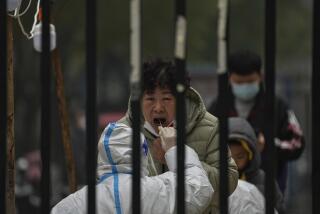East Bloc, China Take Different Paths : Communism: Movements for democratic change succeeded in Eastern Europe but not in Beijing. Scholars tell why.
- Share via
WASHINGTON — Why did events come out so differently this year in Eastern Europe than in China? Why did the movements toward democratic changes succeed in Warsaw, Prague, Budapest and East Berlin while failing in Beijing?
Scholars point to several factors that help explain why the Chinese regime was willing and able to carry out a forceful crackdown while East European governments were not.
First, they say, China, unlike the East Bloc regimes, is still being led by its first generation of Communist leaders--the same elderly men, now in their 80s, who carried out the Chinese revolution.
There is no comparable group of leaders in any East European country. Even Erich Honecker, the 77-year-old leader who ruled East Germany from 1971 until last October, is a neophyte when compared to China’s octogenarian Old Guard.
Chinese leader Deng Xiaoping, 85, joined the Communist Party in 1924, helped win one of the most important military campaigns during China’s civil war and first served as general secretary of the party in 1954.
“Deng Xiaoping and his associates were prepared to defend the power that they had accumulated over the years,” observes Roderick MacFarquhar, a Harvard University professor.
Second, analysts say, the countries of Eastern Europe have a history and tradition of democratic institutions and culture, while China does not.
“The degree of political sophistication in Eastern Europe is much higher than in China,” says Richard Baum, a professor of political science at UCLA. “In Eastern Europe, there’s a pluralistic structure already in place. You have the (Roman Catholic) Church, labor unions, intellectual groupings that don’t exist in China.”
Also, experts say, the people of Eastern Europe have had a far greater exposure to the West, and to Western ideas, than have the Chinese.
“China was not part of what we might call a competitive democratic environment the way the Eastern European states are,” asserts MacFarquhar. “To the Chinese, the arena for comparison is East Asia--countries such as Taiwan, South Korea and Singapore. None of these places have had real democratic government. Even the Japanese example is ambiguous.”
The third factor is the crucial role played by the Soviet Union and President Mikhail S. Gorbachev.
In Eastern Europe, Gorbachev permitted--indeed encouraged--the changes, largely by making it clear that Soviet troops would not intervene.
No Soviet troops are stationed in China, and neither Gorbachev nor any other Soviet leader has ever had the sort of influence in China that the Soviets have long held in Eastern Europe.
MacFarquhar notes that the Communist governments of Eastern Europe were, in effect, colonial regimes installed at the instigation of the Soviet Union. The Chinese Communist Party, by contrast, has always been independent of Moscow.
Virtually the same explanation was offered recently by Chinese Premier Li Peng, one of the hard-line leaders who spearheaded last June’s military crackdown in Beijing. Li was asked recently about the changes in Eastern Europe.
“China is naturally concerned,” he said. However, he added, “China does not link events in East Germany and events in China, because there are many differences between the two. . . . China adopted socialism to provide its people with better living conditions and economic prosperity.”
Li’s indirect message was that East European countries adopted socialism for other reasons, such as the pressure of the Soviet Union.
Even with all these differences, specialists say, the changes in Eastern Europe might not have taken place as peacefully as they have were it not for last June’s turmoil in Beijing.
At the peak of the crisis in East Germany, for example, Honecker reportedly instructed East German officials to prepare for a “Chinese solution” to the throngs of pro-democracy demonstrators. But Egon Krenz, who later replaced him as president, and other East German officials reportedly dissuaded him from carrying out the order.
“What happened in China probably sobered the leaders of these other countries to realize how high the costs of a crackdown would be, both at home and overseas,” Baum says.
More to Read
Sign up for Essential California
The most important California stories and recommendations in your inbox every morning.
You may occasionally receive promotional content from the Los Angeles Times.













